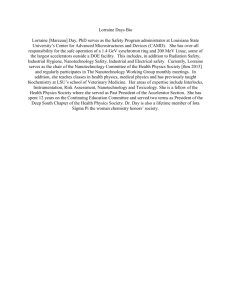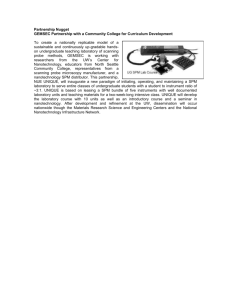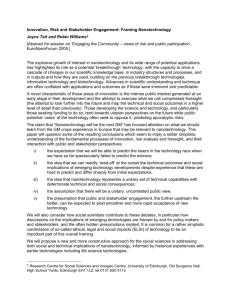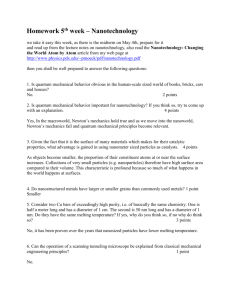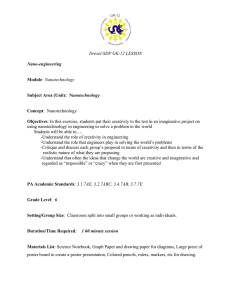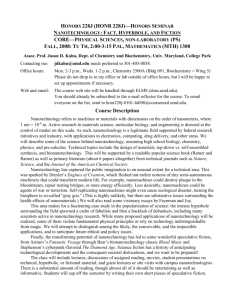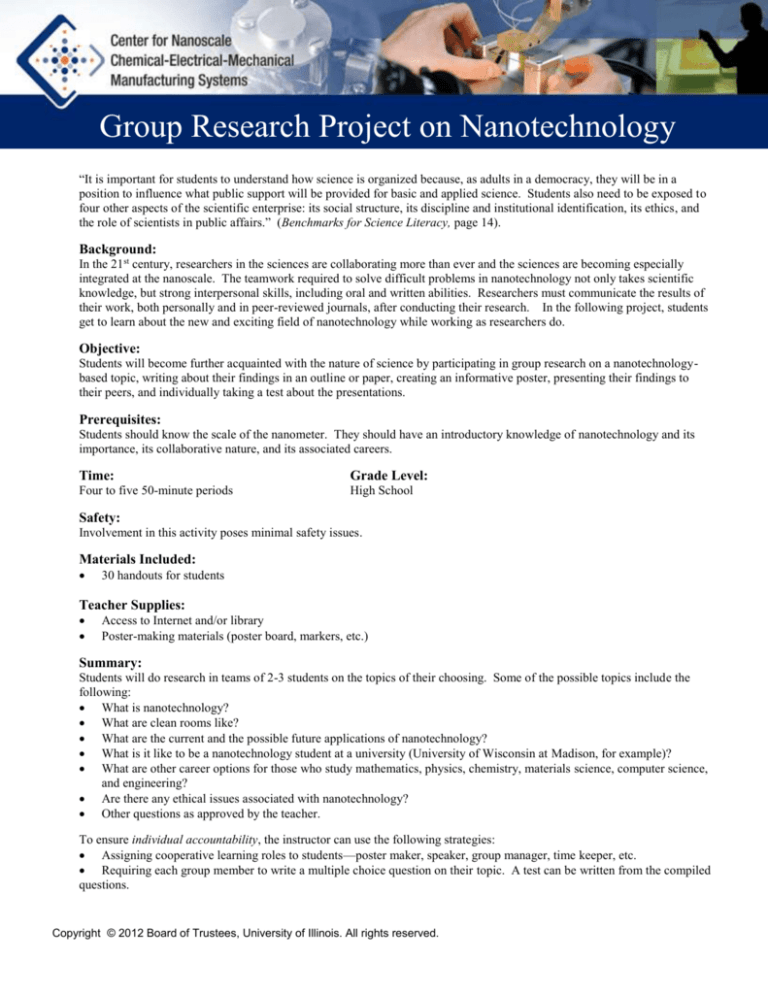
Group Research Project on Nanotechnology
“It is important for students to understand how science is organized because, as adults in a democracy, they will be in a
position to influence what public support will be provided for basic and applied science. Students also need to be exposed to
four other aspects of the scientific enterprise: its social structure, its discipline and institutional identification, its ethics, and
the role of scientists in public affairs.” (Benchmarks for Science Literacy, page 14).
Background:
In the 21st century, researchers in the sciences are collaborating more than ever and the sciences are becoming especially
integrated at the nanoscale. The teamwork required to solve difficult problems in nanotechnology not only takes scientific
knowledge, but strong interpersonal skills, including oral and written abilities. Researchers must communicate the results of
their work, both personally and in peer-reviewed journals, after conducting their research. In the following project, students
get to learn about the new and exciting field of nanotechnology while working as researchers do.
Objective:
Students will become further acquainted with the nature of science by participating in group research on a nanotechnologybased topic, writing about their findings in an outline or paper, creating an informative poster, presenting their findings to
their peers, and individually taking a test about the presentations.
Prerequisites:
Students should know the scale of the nanometer. They should have an introductory knowledge of nanotechnology and its
importance, its collaborative nature, and its associated careers.
Time:
Grade Level:
Four to five 50-minute periods
High School
Safety:
Involvement in this activity poses minimal safety issues.
Materials Included:
30 handouts for students
Teacher Supplies:
Access to Internet and/or library
Poster-making materials (poster board, markers, etc.)
Summary:
Students will do research in teams of 2-3 students on the topics of their choosing. Some of the possible topics include the
following:
What is nanotechnology?
What are clean rooms like?
What are the current and the possible future applications of nanotechnology?
What is it like to be a nanotechnology student at a university (University of Wisconsin at Madison, for example)?
What are other career options for those who study mathematics, physics, chemistry, materials science, computer science,
and engineering?
Are there any ethical issues associated with nanotechnology?
Other questions as approved by the teacher.
To ensure individual accountability, the instructor can use the following strategies:
Assigning cooperative learning roles to students—poster maker, speaker, group manager, time keeper, etc.
Requiring each group member to write a multiple choice question on their topic. A test can be written from the compiled
questions.
Copyright © 2012 Board of Trustees, University of Illinois. All rights reserved.
Grading Rubric:
Each group:
Exhibits team work
Takes notes
Completes an outline or paper
Makes poster that is easy to read and contains text and pictures
Presents clearly
Each student:
Writes a multiple-choice question
Takes a test on class-composed questions
Useful Websites for Research:
How Nanotechnology Will Work
http://science.howstuffworks.com/nanotechnology2.htm
IPSE, University of Wisconsin
http://mrsec.wisc.edu/Edetc/technologist/index.html
Myths and Realities of Nano-Futures
http://news.bbc.co.uk/1/hi/sci/tech/3920685.stm
Nanoscience and Technology at Los Alamos National Laboratory
http://www.lanl.gov/mst/nano/definition.html
National Nanotechnology Initiative
www.nano.gov
The Science Museum
http://www.sciencemuseum.org.uk/antenna/nano/
Modifications:
This activity would work well in a cooperative learning setting, though it could be carried out as individual research projects
as well.
National Science Education Standards
Content Standard E: Understandings about Science and Technology
Content Standard G: Science as a Human Endeavor.
Illinois State Learning Standards:
Science
13.B.5b Analyze and describe the processes and effects of scientific and technological breakthroughs.
13.B.5e Assess how scientific and technological progress has affected other fields of study, careers and job markets and
aspects of everyday life.
Language Arts
3.A.4 Use standard English to edit documents for clarity, subject/verb agreement, adverb and adjective agreement and verb
tense; proofread for spelling, capitalization and punctuation; and ensure that documents are formatted in final form for
submission and/or publication.
4.A.4a Apply listening skills as individuals and members of a group in a variety of settings (e.g., lectures, discussions,
conversations, team projects, presentations, interviews).
4.B.4b Use group discussion skills to assume leadership and participant roles within an assigned project or to reach a group
goal.
5.A.5b Research, design and present a project to an academic, business or school community audience on a topic selected
from among contemporary issues.
5.C.4b Produce oral presentations and written documents using supportive research and incorporating contemporary
technology.
Reference:
American Association for the Advancement of Science. Benchmarks for Science Literacy. Oxford University Press, Oxford:
1993.

